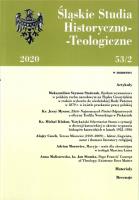Pope Francis' concept of theology
Pope Francis' concept of theology
existence does matter
Author(s): Jan Słomka, Anna MaliszewskaSubject(s): Systematic Theology
Published by: Księgarnia Świętego Jacka
Keywords: Pope Francis;faith;theology;Lumen Fidei;culture;Magisterium of the Church;existentialism;
Summary/Abstract: Documents published by Pope Francis are theological texts in the full meaning of the word. Francis writes in the first person. It is not only a rhetorical figure, but also an evidence of his “authorship” of the texts. This article seeks to present Francis’ concept of theology. His theology builds on faith, which is prior to any form of reasoning. Reasoning, including theology, is merely a servant of faith: a servant that always remains outside the mystery of faith, or the encounter of a human being with God. Therefore, the first two parts of the article are devoted to Francis’ perception of faith. The transmission of faith, or evangelization, takes place in the proclamation of the kerygma. Here also, theology plays an ancillary role. The Church lives in the world, and that determines the tasks of theology: seeking an answer to the question about what it means to be a Christian here and now. Thus, theology should study various aspects of our existence, and particularly various cultures, in the light of faith. Francis, however, distances himself from liaising theology with modern sciences. Francis’ recognition of the primacy of God’s grace leads him to an emphasis on the significance of dialogue in the study of theology. It is interesting how Francis perceives the role of the Magisterium of the Church: it is ancillary not only to faith, but, to a certain degree, also to theology. Moreover, as it turns out, theology understood in such a way draws richly from the works of modern philosophy: existentialism and the related philosophy of dialogue.
Journal: Śląskie Studia Historyczno-Teologiczne
- Issue Year: 53/2020
- Issue No: 2
- Page Range: 265-284
- Page Count: 20
- Language: English

